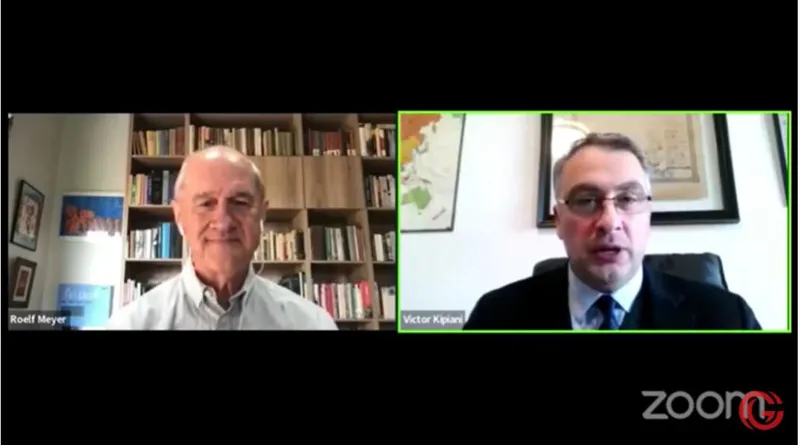POLITICS
21.01.22 14:10

Geocase hosted a webinar on ‘South African Experience of Transition from Apartheid to Democracy: achievements, ongoing challenges and lessons to learn for global community’ conducted by the distinguished guest Mr Roelf Meyer, Founding Director of South African organization In Transformation Initiative (ITI), former South African Minister, politician and Chief Negotiator in the historic process that ended apartheid.
The webinar was moderated by Mr Victor Kipiani, the Chairman of Geocase. He welcomed the guest and introduced him to the audience. The moderator noted that the webinar was the very first ever event offered to the Georgian audience and the community of experts which portrayed South Africa not only in terms of ending the apartheid but its internal politics, external ramifications.
Mr Roelf Meyer briefly overviewed a history of the apartheid regime in South Africa and shared his own story how the person with a very conservative background raised in the family supporting apartheid experienced a fundamental change in his standpoint and later entered politics with one purpose: to make a change in order to end apartheid. And when he was elected in the parliament as a member of the that-time ruling party – the National Party, he started working for the change from within. “People say it’s impossible to bring about change, I’m saying from my own experience: I know it is possible if you work from within on a dedicated basis and full commitment”, stated Mr Meyer.
During his speech, he particularly emphasized the historical merit of Nelson Mandela, South Africa’s first black president, Frederik Willem de Klerkand, President of South Africa from 1989 to 1994, and Archbishop Desmond Tutu, who played an enormous role in favor of peace and reconciliation of the South African people after the demise of apartheid.
“You need inner conviction if you want to stand up as a leader under such circumstances. You can’t lead and persuade others just being an opportunist. So many times, I’ve observed politicians who might have had good intentions but they were totally opportunistic in their approaches with no inner conviction”.
Speaking about ending political violence after the regime change Mr Meyer underscored that it was the civil society along with labor unions, the business community and others who were unified to work towards a peace agreement, and the National Peace Accord was adopted which helped to control the political violence and helped to start constitutional negotiations. The concept of this inter-communal dialogue has now been started to be exported to the countries where there is conflict at the local level.
According to Mr Roelf Meyer, there were three factors that made negotiations successful: the inclusiveness of the process, building trust, taking ownership, and responsibility. Successful negotiations led to a smooth transition from apartheid to democracy. He also stressed that the process was very transparent and the role of the media was crucial as it was very constructive and interested in progress.
However, as Mr Meyer pointed out, the socio-economic transformation of the country was humble thus the economic model of the country needs to be redefined.
In the end, Mr Victor Kipiani summarized the event, thanked the guest for the outmost insightful webinar and noted that it was a great opportunity for the Georgian audience to look closer at the South African experience of peacebuilding, reconciliation, and compromise, as well as learn some very practicable lessons from the person of such high authority and interesting background.
Webinar on South African Experience of Transition from Apartheid to Democracy https://bit.ly/33TU5r4
source: IPN
Read: 361
Write comment
(In their comments, readers should avoid expressing religious, racial and national discrimination, not use offensive and derogatory expressions, as well as appeals that are contrary to the law)
News feed
-
18:0019.04.24
-
The state property the government sold this year at the lowest price
17:3019.04.24
-
17:0019.04.24
-
16:1919.04.24
-
Vakhtang Gomelauri: An attack on a policeman means an attack on a state institution
15:4119.04.24
-
15:0019.04.24
-
14:1519.04.24
-
What are the dangers of France's interference in Ukraine and the South Caucasus?
13:3719.04.24
-
The Prime Minister met the Ambassador of Iran in Georgia
12:5719.04.24
-
12:1519.04.24
-
Georgian FM meets U.S. Senior Advisor for Caucasus Negotiations
11:2919.04.24
-
Foreign Ministry denies reports about summoning of Georgian Ambassador to Bundestag
10:0019.04.24
-
Parliament to hear Ministers of Interior and Economy on April 19
18:0018.04.24
-
Competition Agency: 23,983 concentrations of economic entities registered in Q1
17:2518.04.24
-
Georgian PM, EUMM Head review situation in Russian-occupied territories
16:4518.04.24
-
UK Ambassador on transparency bill: hindrances to civil society’s functioning “concerning”
16:1018.04.24
-
15:4018.04.24
-
15:3018.04.24
-
14:4218.04.24
-
13:4118.04.24
-
12:4518.04.24
-
11:0018.04.24
-
10:1118.04.24
-
PM: NGOs never decried calls for second front
18:1117.04.24
-
Ruling party official: future of Georgia belongs to Europe
17:0917.04.24
-
16:1317.04.24
-
15:3117.04.24
-
Parliament adopts bill on Transparency of Foreign Influence with first reading
14:5717.04.24
-
GD MP says foreigners should not call for Rose Revolution in Georgia
13:4717.04.24
-
12:4117.04.24
-
Four police officers got injuries during anti-Transparency Bill protest
11:5417.04.24
-
Russia rushes Iran with Resht-Astara railway line
23:4516.04.24
-
18:0016.04.24
-
17:2516.04.24
-
Communications Commission: EU experts say Georgian mobile market “non-competitive”
16:4316.04.24
-
Georgian Foreign Minister, Chinese delegation discuss bilateral relations
16:0016.04.24


